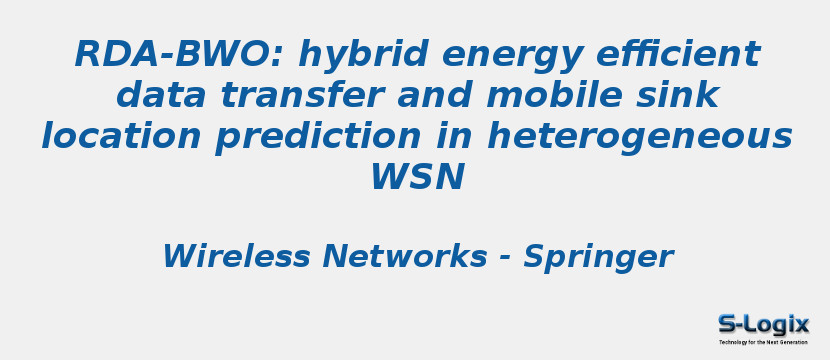Research Area: Wireless Sensor Networks
WSN (Wireless Sensor Network) is an emerging and exigent technology being used in various applications such as health monitoring, GPS tracking, security, environmental monitoring etc. The energy resource of WSN is limited because of the reduced battery power. Also, it is difficult for the sensor nodes in WSN to recharge their batteries in hostile environments. Therefore, the idea of heterogeneous WSN (H-WSN) is introduced in this work which offers extra energy to the nodes based on energy heterogeneity. Here, a hybrid RDA-BWO (Red Deer Algorithm-Black Widow Optimization) method is presented to perform energy efficient data transfer. Multiple Mobile Sinks (MMSs) are employed in the network to avoid multi-hop communication among CHs and sink. In H-WSN, energy efficient data transfer and MSLP (Mobile Sink Location Prediction) with MMSs integrates the strategies namely FCM (Fuzzy C Means) clustering, RDA based CH (Cluster Head) selection, Data collection and aggregation mechanism, BWO based MSLP, hot-spot elimination and MSTP (Mobile Sink Traversal Path). The entire H-WSN is clustered using FCM algorithm. The CH selection make use of distance parameter, residual energy, average energy, number of node neighbours and ECR (Energy Consumption Rate) for the proposed energy efficacy. The proposed H-WSN is implemented in NS2 platform. Simulation results outperform the baseline protocols on different metrics, such as throughput, network lifetime, networks residual energy, number of dead nodes, stability period, and number of alive nodes demonstrate the superiority of the proposed RDA-BWO method.
Keywords:
Author(s) Name: Preeti Gupta,Sachin Tripathi,Samayveer Singh
Journal name: Wireless Networks
Conferrence name:
Publisher name: Springer
DOI: 10.1007/s11276-021-02678-z
Volume Information: volume 27, pages 4421–4440 (2021)
